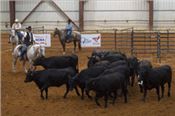|
Low-Stress Cattle Handling Techniques Featured At Conference

Curt Pate, in dark hat and vest, explains how to move cattle on horseback without creating too much stress during the
Stockmanship and Stewardship conference on Oct. 4, 2019, at the Ike Hamilton Expo Center in West Monroe.
Ron Gill, left, and Dean Fish sit on the horses in the background.
Photo by Olivia McClure/LSU AgCenter
WEST MONROE, LA.
Cattle handling tactics that aim to reduce stress for both animals and the humans who work with them were the focus of an event Oct. 4 and 5.
The LSU AgCenter and the University of Arkansas Cooperative Extension Service jointly planned the Stockmanship and Stewardship conference, which was held at the Ike Hamilton Expo Center in West Monroe. The conference travels to several locations nationwide annually; this year marked the first time it has come to Louisiana.
More than 100 people attended the event, which featured presentations by cattle experts from ranches, universities and industry groups. Major sponsors included the Beef Checkoff Program, National Cattlemen’s Beef Association and Merck Animal Health.
It’s important to offer cattle producers opportunities to learn more about the best practices for the industry, said Christine Navarre, a veterinarian with the AgCenter.
“These techniques are good for animal welfare; they’re good for people safety; they’re good for producers’ bottom line because it makes cattle perform better when they’re handled better,” she said.
Navarre spoke at the conference about the Beef Quality Assurance program, which emphasizes “making sure that beef is safe and produced in a manner that’s good for the animals and good for the environment,” she said.
Rick Machen, of the Texas A&M University King Ranch Institute for Ranch Management, talked about economic benefits of low-stress practices such as limiting noise and being clear and intentional in communicating with other handlers and the cattle.
Putting too much pressure on animals can hinder weight gain, reproduction and other key aspects of cattle production, which can lead to lower profits. It also can cause cattle to “sour” on their handlers, making a herd more difficult, costly and time-consuming to manage, Machen said.
How animals are treated has a greater effect on their disposition than genetics, he said, so people who work with cattle should maintain a positive attitude and be open to trying new methods.
“If our behavior creates fear in these animals, it creates stress, and their productivity will go down,” he said.
Attendees of the conference saw demonstrations of ways to avoid stressing cattle in scenarios such as moving them on horseback.
“If we handle them well and we build that trust, they’re going to handle better,” Machen said. “As trust goes up, stress goes down. As stress go down, they’re more productive.”
He added: “It’s the right thing for the cattle; it’s the right thing for the handlers; it’s the right thing for the industry – and it can be a profitable thing." ∆
|
|